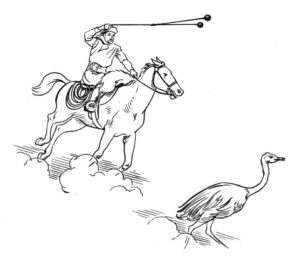“Therefore, since we are surrounded by such a great cloud of witnesses, let us throw off everything that hinders and the sin that so easily entangles. And let us run with perseverance the race marked out for us” (Hebrews 12:1 NIV).
As we close our look at Hebrews 12:1, we will take a moment to consider this reference to “…the race marked out for us.“ This terminology implies that every individual Christian follows a personalized spiritual course that is specifically designed for him or her. While there may be similarities in our individual courses, every race is held on a different track, so to speak.
We can gain further insight into this concept with a brief survey of Jesus’ parable of the Laborers in the Vineyard. That parable relates the account of a landowner who went out very early in the morning to hire laborers for his vineyard. He then hired additional laborers at 9am, noon, 3pm, and 5pm. When evening came, the landowner instructed his manager to pay the laborers for their work. He then provided a day’s wage to each worker, even those who were hired late in the day.
The workers who were hired first then began complain about their compensation. However, the landowner was ready with his response…
“…’Friend, I am not treating you unfairly. Didn’t you agree with me to work for the standard wage? Take what is yours and go. I want to give to this last man the same as I gave to you. Am I not permitted to do what I want with what belongs to me? Or are you envious because I am generous?'” (Matthew 20:13-15 NET).
For application purposes, we might say that our personal vineyard is comprised of the life and work that God has given us. The tools of our trade include the talents, skills, abilities, and/or opportunities that God has provided. Just as every human being is different, so is the type and volume of work that God has given us in our individual vineyards.
Because of this, we may be tempted to look at others’ vineyards to offer suggestions, criticisms, ideas, or opinions regarding what they ought to do. To be fair, this may be appropriate if God has placed us in a supervisory capacity, or if we encounter a teaching or behavior that is clearly misaligned with God’s Word. Nevertheless, it is usually best to focus upon our own “vineyard” and the work that God has given us. (1)
It is often difficult to produce quality work for Christ when we are focused on the work of others. Since God has marked out an individual plan for every man and woman of God (as implied here in Hebrews 12:1). we would do well to concentrate upon those areas of responsibility He has assigned to us.
(1) Also see Paul the Apostle’s comment to the Corinthian church in 2 Corinthians 10:13


 Hebrews 12:12 reminds us that sin is capable of “easily entangling” those who engage in it. We can illustrate this idea with the image of a bola, a weapon used by the indigenous peoples of North and South America. A bola served as a hunter’s weapon and comprised two or more lengths of cord that were tied together. Each cord was then secured with a weight on the other end. A hunter used a bola by throwing it to entangle the legs of his prey and immobilize it.
Hebrews 12:12 reminds us that sin is capable of “easily entangling” those who engage in it. We can illustrate this idea with the image of a bola, a weapon used by the indigenous peoples of North and South America. A bola served as a hunter’s weapon and comprised two or more lengths of cord that were tied together. Each cord was then secured with a weight on the other end. A hunter used a bola by throwing it to entangle the legs of his prey and immobilize it.